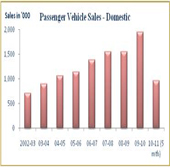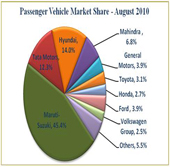
Like most other markets, much of the excitement in India is in the passenger vehicle segment. Robust growth in middle class income levels and easier credit availability have sustained demand growth for passenger cars. Most major global manufacturers are already present in the country, while some of the domestic manufacturers are entering overseas markets.
Despite increased competition, Maruti Suzuki, which is now majority owned by Suzuki Motor Corp, remains the market leader in India with a share of over 45%. Its strength lies in its wide range of small car models, which form the bulk of the Indian car market. Maruti Suzuki also has the largest dealer network and its annual manufacturing capacity is now over 1 million vehicles.
Korean firm Hyundai and domestic major Tata Motors have been in a tight race for the second and third places for a while now. Hyundai is now marginally ahead with a market share of 14% as compared to over 12% for Tata Motors. Small hatchbacks dominate Hyundai�s model lineup and the firm has built up a strong brand reputation over the last several years. Tata Motors has a wider product range, from SUV�s to the world�s cheapest car, the Nano. Tata products are positioned as value-for-money and run predominantly on diesel, which is nearly a third less expensive than gasoline in India because of government subsidies. The firm also jointly owns an assembly line with European carmaker Fiat and markets Fiat cars in India.
 Precision Components
Precision Components Stamping Components
Stamping Components Turned Components
Turned Components Automotive Components
Automotive Components

